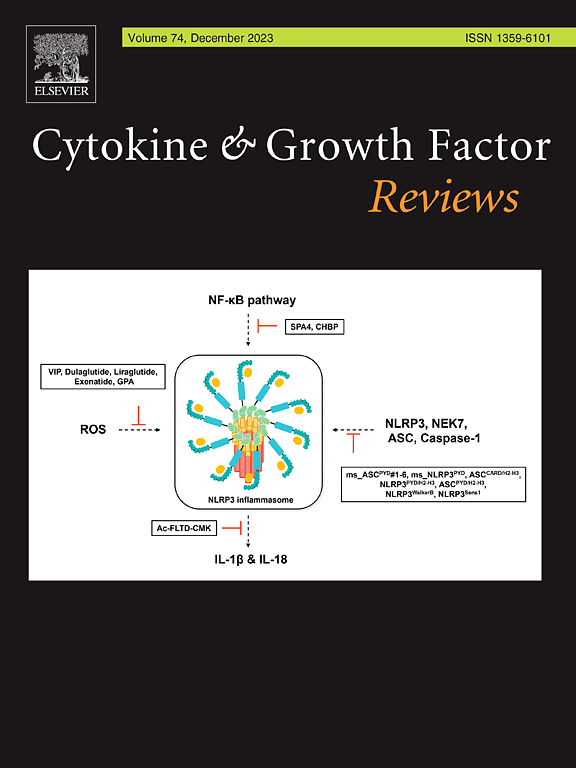MIF 在缺血性心脏病发病机制中的不同作用。
IF 9.3
2区 医学
Q1 BIOCHEMISTRY & MOLECULAR BIOLOGY
引用次数: 0
摘要
巨噬细胞迁移抑制因子(MIF)是一种多功能细胞因子,在免疫调节和炎症反应中的作用日益受到重视。缺血性心脏病(IHD)是导致全球死亡的主要原因,由于其病理生理学错综复杂,它仍然是研究的焦点。MIF 被认为是缺血性心脏病的关键因素,在其中发挥着不同的作用。一方面,MIF 通过激活 AMPK 加强能量代谢、抵抗氧化应激、抑制 JNK 通路的激活以及维持细胞内钙离子的平衡,从而发挥保护作用。此外,MIF 还通过间充质干细胞和外泌体发挥保护作用。另一方面,MIF 可发挥促炎作用,从而加剧 IHD 的发展和恶化。此外,IHD 患者体内的 MIF 水平明显升高,其基因多态性与发病率和严重程度呈正相关。这些发现使 MIF 成为治疗 IHD 的潜在生物标志物和治疗靶点。本综述总结了 MIF 的结构、来源、信号传导途径和生物功能,并重点讨论了其在 IHD 中的作用和临床特征。此外,还讨论了与 IHD 相关的 MIF 基因变异,使人们对其在疾病病理中的复杂相互作用有了更多的了解。本文章由计算机程序翻译,如有差异,请以英文原文为准。
Distinct roles of MIF in the pathogenesis of ischemic heart disease
The role of macrophage migration inhibitory factor (MIF) as a multifunctional cytokine in immunomodulation and inflammatory response is increasingly appreciated. Ischemic heart disease (IHD), the leading cause of global mortality, remains a focal point of research owing to its intricate pathophysiology. MIF has been identified as a critical player in IHD, where it exerts distinct roles. On one hand, MIF plays a protective role by enhancing energy metabolism through activation of AMPK, resisting oxidative stress, inhibiting activation of the JNK pathway, and maintaining intracellular calcium ion homeostasis. Additionally, MIF exerts protective effects through mesenchymal stem cells and exosomes. On the other hand, MIF can assume a pro-inflammatory role, which contributes to the exacerbation of IHD's development and progression. Furthermore, MIF levels significantly increase in IHD patients, and its genetic polymorphisms are positively correlated with prevalence and severity. These findings position MIF as a potential biomarker and therapeutic target in the management of IHD. This review summarizes the structure, source, signaling pathways and biological functions of MIF and focuses on its roles and clinical characteristics in IHD. The genetic variants of MIF associated with IHD is also discussed, providing more understandings of its complex interplay in the disease's pathology.
求助全文
通过发布文献求助,成功后即可免费获取论文全文。
去求助
来源期刊

Cytokine & Growth Factor Reviews
生物-生化与分子生物学
CiteScore
21.10
自引率
1.50%
发文量
61
审稿时长
22 days
期刊介绍:
Cytokine & Growth Factor Reviews is a leading publication that focuses on the dynamic fields of growth factor and cytokine research. Our journal offers a platform for authors to disseminate thought-provoking articles such as critical reviews, state-of-the-art reviews, letters to the editor, and meeting reviews.
We aim to cover important breakthroughs in these rapidly evolving areas, providing valuable insights into the multidisciplinary significance of cytokines and growth factors. Our journal spans various domains including signal transduction, cell growth and differentiation, embryonic development, immunology, tumorigenesis, and clinical medicine.
By publishing cutting-edge research and analysis, we aim to influence the way researchers and experts perceive and understand growth factors and cytokines. We encourage novel expressions of ideas and innovative approaches to organizing content, fostering a stimulating environment for knowledge exchange and scientific advancement.
 求助内容:
求助内容: 应助结果提醒方式:
应助结果提醒方式:


